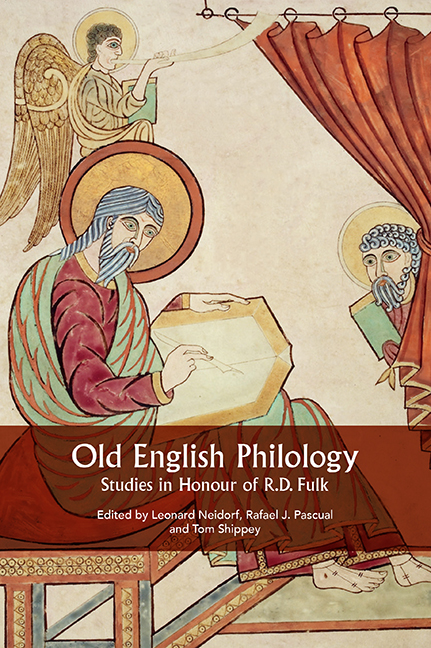Book contents
- Frontmatter
- Contents
- List of Illustrations
- Acknowledgements
- List of Contributors
- Introduction: R.D. Fulk and the Progress of Philology
- 1 Sievers, Bliss, Fulk, and Old English Metrical Theory
- 2 Ictus as Stress or Length: The Effect of Tempo
- 3 Metrical Criteria for the Emendation of Old English Poetic Texts
- 4 The Suppression of the Subjunctive in Beowulf: A Metrical Explanation
- 5 Metrical Complexity and Verse Placement in Beowulf
- 6 Alliterating Finite Verbs and the Origin of Rank in Old English Poetry
- 7 Prosody-Meter Correspondences in Late Old English and Poema Morale
- 8 The Syntax of Old English Poetry and the Dating of Beowulf
- 9 The Anglo-Saxons and Superbia: Finding a Word for it
- 10 Old English gelōme, gelōma, Modern English loom, lame, and Their Kin
- 11 Worm: A Lexical Approach to the Beowulf Manuscript
- 12 Wulfstan, Episcopal Authority, and the Handbook for the Use of a Confessor
- 13 Some Observations on e-caudata in Old English Texts
- 14 The Poetics of Poetic Words in Old English
- 15 Dream of the Rood 9b: A Cross as an Angel?
- 16 The Fate of Lot’s Wife: A ‘Canterbury School’ Gloss in Genesis A
- 17 Metrical Alternation in The Fortunes of Men
- 18 The Originality of Andreas
- 19 The Economy of Beowulf
- 20 Beowulf Studies from Tolkien to Fulk
- The Writings of R.D. Fulk
- Index
- Tabula Gratulatoria
- Anglo-Saxon Studies
13 - Some Observations on e-caudata in Old English Texts
Published online by Cambridge University Press: 29 May 2021
- Frontmatter
- Contents
- List of Illustrations
- Acknowledgements
- List of Contributors
- Introduction: R.D. Fulk and the Progress of Philology
- 1 Sievers, Bliss, Fulk, and Old English Metrical Theory
- 2 Ictus as Stress or Length: The Effect of Tempo
- 3 Metrical Criteria for the Emendation of Old English Poetic Texts
- 4 The Suppression of the Subjunctive in Beowulf: A Metrical Explanation
- 5 Metrical Complexity and Verse Placement in Beowulf
- 6 Alliterating Finite Verbs and the Origin of Rank in Old English Poetry
- 7 Prosody-Meter Correspondences in Late Old English and Poema Morale
- 8 The Syntax of Old English Poetry and the Dating of Beowulf
- 9 The Anglo-Saxons and Superbia: Finding a Word for it
- 10 Old English gelōme, gelōma, Modern English loom, lame, and Their Kin
- 11 Worm: A Lexical Approach to the Beowulf Manuscript
- 12 Wulfstan, Episcopal Authority, and the Handbook for the Use of a Confessor
- 13 Some Observations on e-caudata in Old English Texts
- 14 The Poetics of Poetic Words in Old English
- 15 Dream of the Rood 9b: A Cross as an Angel?
- 16 The Fate of Lot’s Wife: A ‘Canterbury School’ Gloss in Genesis A
- 17 Metrical Alternation in The Fortunes of Men
- 18 The Originality of Andreas
- 19 The Economy of Beowulf
- 20 Beowulf Studies from Tolkien to Fulk
- The Writings of R.D. Fulk
- Index
- Tabula Gratulatoria
- Anglo-Saxon Studies
Summary
It is not a revelation to observe that modern editorial practices obscure many features of the manuscripts that preserve Old English texts. Word division, word spacing, punctuation, capitalization, emendation (even when well justified), and the like construct an alternate text, different in many striking ways from the texts found in manuscripts. But the orthographical variation found in manuscripts is almost always preserved in the standard scholarly editions of Old English texts – conservative editorial principles hold that unusual spellings are not construed as errors (and therefore subject to intervention) in the absence of, as Fulk, Bjork, and Niles (2008: cxc) suggest, “a high degree of linguistic improbability”; spelling normalization may be a feature of classroom grammars and other beginner's texts, but only the most obvious of scribal errors usually compels a modern editor to offer an emended spelling. But one form of spelling variation that is often normalized even in modern critical editions of Old English texts is scribes’ use of ę (sometimes called “cedillated-e” or “e-caudata”), and the relative invisibility of the graph in our edited texts has no doubt disabled some potentially instructive commentary on a small aspect of scribal behavior.
Of course, scribal behavior in spelling may be conditioned in two broad ways. The first of these, naturally, is linguistic in nature. As Fulk says in his A History of Old English Meter, “The assumption of a certain amount of phonological significance to spelling is inevitable, since most conditioned variations have no reasonable orthographic explanation for their conditioning” (1992: 47). The second broad condition for scribal spelling is non-linguistic in nature: spelling may be influenced by “a written language system” that has “nothing to do with spoken language” (Parkes 1994: 24). At the same time that Fulk’s A History of Old English Meter powerfully demonstrated the linguistic meanings of Old English poetic texts through the application of rigorous philological methods to the interaction of language and meter, D.G. Scragg could urge “that students of Old English should not be blinded by the prescriptions of linguists” since “[h]owever poorly spelling variation charts developments in … phonology, it gives ample evidence of scribal habits, manuscript relations, scriptorium practices and the development of a formal written language” (1992: 348).
- Type
- Chapter
- Information
- Old English PhilologyStudies in Honour of R.D. Fulk, pp. 233 - 255Publisher: Boydell & BrewerPrint publication year: 2016



